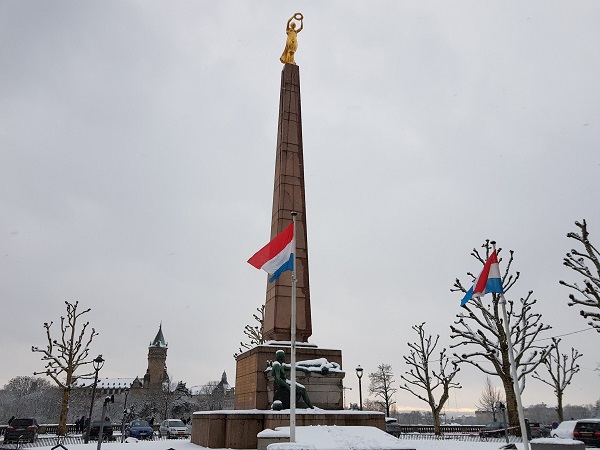 "Gëlle Fra";
Credit: Jazmin Campbell
"Gëlle Fra";
Credit: Jazmin Campbell
Friday was Human Rights Day. Every year on 10 December, the day on which (in 1948) the United Nations adopted the Universal Declaration of Human Rights, the international community observes Human Rights Day.
In Luxembourg, Amnesty International traditionally organises a family-friendly torchlight parade in the capital. This year, however, the organisers felt compelled to cancel their public celebration of human rights amid safety concerns. Instead, they asked members of the public to show their support at home, by standing outside their front doors holding a lit candle on Friday evening.
The decision to cancel this year’s parade came following the violent COVID-19 protests that shook Luxembourg City last weekend. According to the Grand Ducal Police, around 2,000 people gathered on the afternoon of Saturday 4 December 2021 to voice their opposition to government measures aimed at curbing the spread of coronavirus. Whilst the demonstrations started out peacefully, things soon turned violent.
There were scenes of protesters clashing with police officers as they climbed and knocked over barriers to get into the Christmas markets, access to which is subject to a valid CovidCheck certificate (proving COVID-19 vaccination, recovery or a negative test result) – one of the very measures participants were protesting. This unruly behaviour forced the authorities to temporarily close the markets. Elsewhere in the capital, there were reports of protesters egging the Prime Minister’s house and disrupting traffic.
Perhaps some of the most shocking behaviour last weekend, however, was when certain individuals climbed the Monument of Remembrance (better known as the Gëlle Fra, Luxembourgish for “Golden Lady”), a cherished memorial dedicated to the thousands of Luxembourgers who volunteered for the Allies during the two World Wars and the Korean War, and a symbol of Luxembourgish freedom and independence, wearing yellow badges, seemingly comparing the COVID-19 restrictions to life under Nazi rule. As a trained historian myself, I find such comparisons to be not only utterly shameful but also completely incorrect. And I am not the only one; the National Museum of Resistance and Human Rights argued in an open letter to those involved in Saturday’s protests that such parallels are “based either on a blatant lack of historical knowledge, or […] on a deliberate falsification and instrumentalisation of history”. Likewise, the Committee for the Remembrance of the Second World War condemned the way in which demonstrators had “unacceptably abused” the history of World War II, adding that anyone who uses a yellow badge to protest against vaccination “has understood nothing about the history of the Shoah”.
The violent protests also sparked condemnation from politicians across the spectrum. One of the first to react was Luxembourg’s Prime Minister Xavier Bettel, who described these acts as unacceptable and argued that “solidarity, democracy and humanity are stronger than hatred, violence and selfishness”. Despite recognising that “[w]e live in a free and democratic country, where everyone can have their say”, he stressed that: “Freedom of opinion does not mean that one can frighten families with small children by storming Christmas markets”. Deputy Prime Minister François Bausch and Internal Security Minister Henri Kox, as well as members of the opposition, were among several other public figures to publicly condemn the protests.
As well as contributing to the decision of Amnesty International to cancel their torchlight parade, last weekend’s violence led to the authorities announcing the establishment of a restricted protest zone in Luxembourg City for future demonstrations against the coronavirus measures. There is also set to be a strengthened police presence at such protests in future, including those planned to take place in the capital this weekend.
A Europe-wide phenomenon
Luxembourg is certainly not the only country where people are taking to the streets to denounce COVID-19 restrictions. Stricter rules (in many cases much stricter than those in the Grand Duchy) are being implemented across Europe as coronavirus cases surge. Measures include mandatory vaccinations and lockdowns. Evidently, not everyone is content with these rules, which some believe infringe on their rights and freedom.
Last week, neighbouring Belgium announced plans to make mask wearing mandatory for children over the age of 6, close primary schools and switch to hybrid teaching in secondary schools, sparking outrage from certain members of the public. Last Sunday, thousands of people gathered in Brussels to protest the new measures. Whilst most participants marched peacefully, police were pictured using water cannons and tear gas to disperse rowdier protesters.
A few weeks prior, around 40,000 people in Vienna reportedly marched against the nationwide lockdown and vaccine mandate (set to come into effect in February) announced by the Austrian government. Similar protests erupted in the Netherlands, Germany, Croatia and Italy, among other European countries, in recent weeks and, in many cases, there were scenes of protesters clashing with police and causing disruption.
Individualism vs the common good
Whilst everyone has the right to freedom of expression and to freedom of peaceful assembly (as enshrined in articles 11 and 12 of the EU Charter of Fundamental Rights), governments (and indeed all of us) are currently faced with the task of balancing personal freedoms with the common good. It is evident that the unvaccinated are contibuting to the fourth wave of coronavirus infections across Europe. The challenge now is to convince those who have not yet had the jab (apart from those who are medically exempt) to do so as quickly as possible so we can get closer to achieving herd immunity and help prevent healthcare systems from collapsing. Governments must find measures which protect the community and promote the idea of solidarity, whilst avoiding discrimination and divisions. Unfortunately, this is still a far off goal. As the recent protests have shown, European society is rife with division. And this is not limited to the individual level: since the start of the pandemic, EU member state governments have taken divergent approaches to tackling the virus.
Whilst individualism may have been the norm for many European countries pre-pandemic, such approaches simply do not help our cause in fighting a global pandemic, a fight which requires ALL of us to work together and make small sacrifices (like wearing a mask, keeping our distance, adhering to the CovidCheck rules...) for the greater good.















